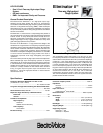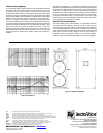
© Telex Communications, Inc. 06/2001
Part Number 38109-991 Rev A
U.S.A. and Canada only.
For customer orders, contact the Customer Service department at
800/392-3497 Fax: 800/955-6831
For warranty repair or service information, contact the Service
Repair department at 800/685-2606
For technical assistance, contact Technical Support at 866/78AUDIO
Please refer to the Engineering Data Sheet for warranty information.
Specifications subject to change without notice.
USA 12000 Portland Ave South, Burnsville, MN 55337, Phone: 952-884-4051, Fax: 952-884-0043
Canada 705 Progress Avenue, Unit 46, Scarborough, Ontario, Canada, M1H2X1, Phone: 416-431-4975, 800-881-1685, Fax: 416-431-4588
Germany Hirschberger Ring 45, D94315, Straubing, Germany, Phone: +49 9421-706 0, Fax: +49 9421-706 287
France Parc de Courcerin, Allee Lech Walesa, Lognes, 77185 Marne la Vallee, France, Phone: +33 1 6480-0090, Fax: +33 1 6480-4538
Australia Unit 23, Block C, Slough Business Park, Slough Avenue, Silverwater, N.S.W. 2128, Australia, Phone: +61 2-9648-3455, Fax: +61 2-9648-5585
Hong Kong Unit E & F, 21/F, Luk Hop Industrial Bldg., 8 Luk Hop St., San PO Kong, Kowloon, Hong Kong, Phone: +852-2351-3628, Fax: +852-2351-3329
Japan 5-3-8 Funabashi, Setagaya-ku, Tokyo, 156-0055 Japan, Phone: +81 3-5316-5020, Fax: +81 3-5316-5031
Singapore 3015A Ubi Rd 1,05-10, Kampong Ubi Industrial Estate, Singapore 408705,Phone: +65-746-8760, Fax: +65-746-1206
Mexico Av. Parque Chapultepec #66-201, Col. EI Parque Edo. De Mexico 53390, Mexico, Phone: +52 5358-5434, Fax: +52 5358-5588
UK 4, The Willows Centre, Willow Lane, Mitcham,Surrey CR4 4NX, UK, Phone: +44 181 640 9600, Fax: +44 181 646 7084
Africa,Mid-East Hirschberger Ring 45, D94315, Straubing, Germany, Phone: +49 9421-706 0, Fax: 49 9421-706 287
Latin America 12000 Portland Ave South, Burnsville, MN 55337, Phone: 952-887-7491, Fax: 952-887-9212
www.electrovoice.com Telex Communications, Inc. www.telex.com
Power-Handling Capacity
To our knowledge, Electro-Voice was the first U.S. manufacturer to develop
and publish a power test closely related to real-life conditions. First, we use
a random-noise input signal because it contains many frequencies
simultaneously, just like real voice or instrument program. Second, our signal
contains more energy at extremely high and low frequencies than typical
actual program, adding an extra measure of reliability. Third, the test signal
includes not only the overall “long term average” or “continuous” level –
which our ears interpret as loudness – but also short-duration peaks which
are many times higher than the average, just like actual program. The long-
term average level stresses the speaker thermally (heat). The instantaneous
peaks test mechanical reliability (cone and diaphragm excursion). Note
that the sine-wave test signals sometimes used have a much less
demanding peak value relative to their average level. In actual use, long-
term average levels exist from several seconds on up, but we apply the
long-term average for several hours, adding another extra measure of
reliability.
Specifically, the Eliminator ii
™
is designed to withstand the power test
described in the ANSI/EIA RS-426-A 1980. The EIA test spectrum is applied
for eight hours. To obtain the spectrum, the output of a white-noise generator
(white noise is a particular type of random noise with equal energy per
bandwidth in Hz) is fed to a shaping filter with 6-dB-per-octave slopes below
40 Hz and above 318 Hz. When measured with the usual constant-
percentage bandwidth analyzer (one-third-octave), this shaping filter
produces a spectrum whose 3-dB-down points are at 100 Hz and 1,200 Hz
with a 3-dB-per-octave slope above 1,200 Hz.
Amplifier Recommendations
The power-handling rating of the Eliminator ii
™
is 600-watts continuous.
The specific tests used employ a crest factor (ratio of peak energy to
continuous energy) of at least 6 dB. During extended testing, the Eliminator
ii™ is routinely subjected to peak levels far in excess of its continuous
rating of 600 watts. Many amplifier designs are capable of producing peak
power levels in excess of their ratings as well, so exact “pairing” of
loudspeaker rating and amplifier ratings is not necessary. Amplifier
continuous ratings of 300 watts to 600 watts into 4 ohms are suggested.
Figure 1. Frequency Response
Figure 2. Impedance
Figure 3. Dimension Drawing




